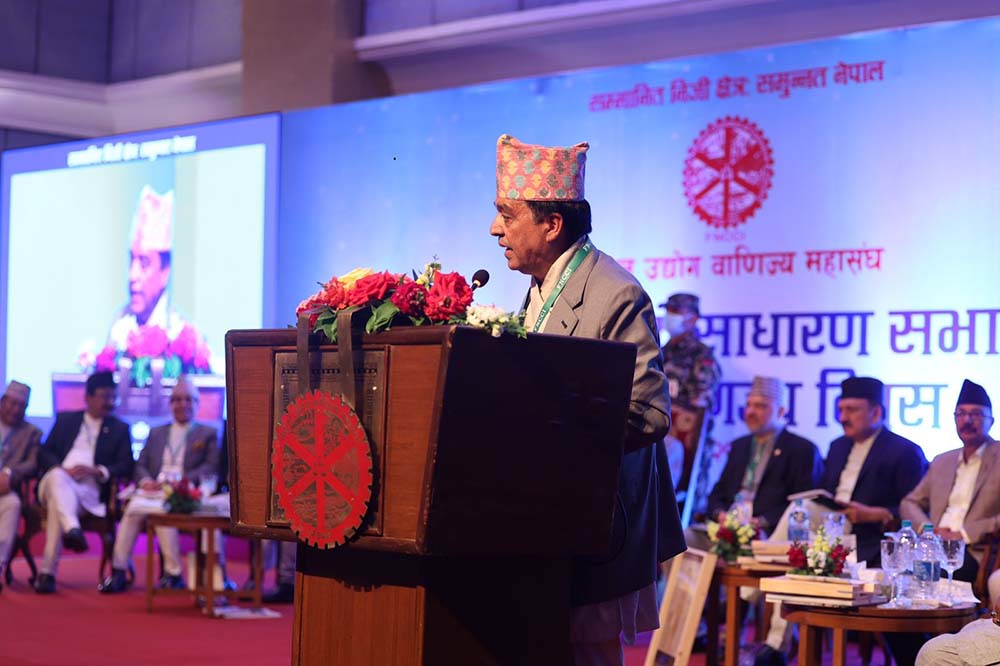
The Federation of Nepalese Chambers of Commerce and Industry (FNCCI), being the apex representative body of the private sector, can play an effective role in making the private sector an engine of growth.
The role of the private sector in development has been embraced since the Eighth Plan in Nepal and the involvement and investment of the private sector in the development process has been thereby encouraged.
The Constitution of Nepal also recognises the private sector as the pillar of the country's economic growth. The constitution envisages a policy of strengthening the national economy through the participation and independent development of the public, private and cooperative sectors. Also, attaching importance to the role of the private sector in the economy to achieve prosperity by utilising the available resources to the maximum extent, the incumbent government has devised various laws and bylaws meant to facilitate the private sector.
A prosperous Nepal is a national aspiration, but the country's economic growth rate is not satisfactory. The economic growth rate of the current fiscal year is projected to be around 4%, while the inflation rate is more than 7%, according to NRB's statistics. The growth projections of the Asian Development Bank and the World Bank have also shown that comprehensive reforms of the economy are desirable.
Finance Minister Mahat while addressing the FNCCI plenum admitted, "The goal of creating a prosperous country by creating economic development and employment will not be achieved with the economic growth of four per cent of the country. Therefore, Prime Minister Pushpa Kamal Dahal has laid strong emphasis on coordination and cooperation between the government and the private sector to realisse the dream of a prosperous Nepal."
The Prime Minister, also Chairman of CPN (Maoist Centre) which has a socialist goal and the Finance Minister from the Nepali Congress which has implemented a liberal economic policy in Nepal, from the parties participating in the current government to the main opposition CPN-UML has accepted the three-pillar economic policy, coordinating the public, private and cooperative sectors, for building a strong national economic policy. We should understand and learn from the experiences, education and examples of foreign countries, but the policy should be decided according to the indigenous economic and political character and originality of our own.
After adopting liberalism, the private sector became almost self-sufficient in several sectors but there are serious questions about the arbitrariness of prices and accountability towards the citizens. The state is taking on the role of the private sector by providing opportunities and facilities for the development of the national economy but the private sector is only looking at its own profits and is extracting as many facilities as possible from the state, but squeezing the consumers.
The role of the private sector in the economic development of any country that has adopted an open and liberal economy has always remained important. Conducting business on the basis of professional values and standards, increasing the quality of goods and services and providing services to the public in an accessible manner is of paramount importance. There is a competition to increase income and employment by augmenting investment with innovative idea and technology.
Lack of stability, development of physical infrastructure, industrial insecurity, investment-friendly environment, and the uncertainty of tax rates, etc have not encouraged the private sector to invest. To overcome these hurdles, political will and commitment, consensus and political leadership in the development of physical infrastructure and foundations are required.
It is necessary for the government, the private sector and the cooperative sector to move forward at the same pace with values such as collective unity, effort, harmony, humanity, and brotherhood based on the principle of cooperation, coexistence and consensus. If the private sector can work confidently, economic development, job creation and investment will be attracted and the country as a whole can become prosperous. Therefore, it is imperative to create an investment-friendly environment for production growth, employment increment and import substitution thereby starting point of economic reform.
By RSS
READ ALSO:
Published Date: May 3, 2023, 12:00 am
Post Comment
E-Magazine
RELATED B360 National




-1772448796.jpeg)
